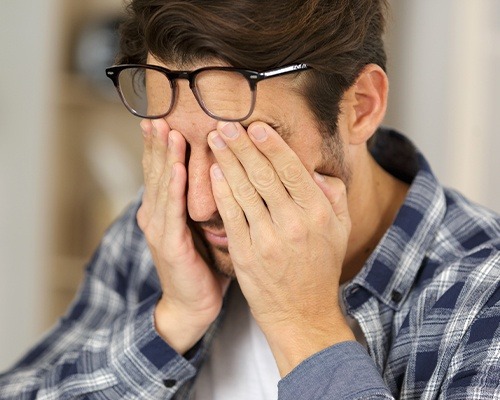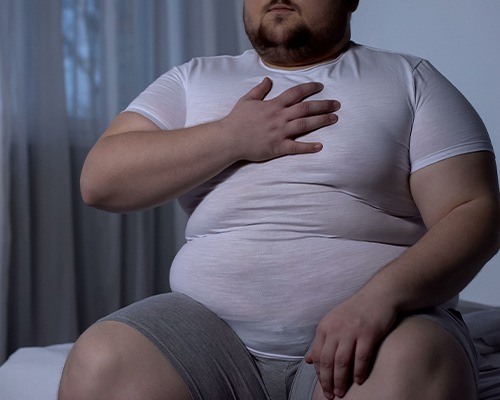Causes of Sleep Apnea – Las Vegas, NV
Learn What’s Causing Your Sleepless Nights

More people than ever know about sleep apnea and the available treatment options to improve their sleep and their health, which is fantastic! What many of our new iSleepSolutions patients don’t know about sleep apnea is the cause. Below, we’ll walk through the two main causes of sleep apnea, common risk factors, and prevention tips.
If you’ve been recently diagnosed with sleep apnea, or you’re concerned you may be struggling with this common sleep disorder, give our Las Vegas sleep dentist and team a call to schedule a complimentary consultation. We’ll review your symptoms, discuss diagnosis options, and help you on your way to deeper, more refreshing sleep.
The Two Types of Sleep Apnea

Sleep apnea is a condition where a person stops breathing for ten or more seconds at a time during sleep. Those with advanced sleep apnea can have hundreds or even thousands of apnea events each night. This causes patients to wake up and restart breathing. Even if you don’t remember the repeated sleep apnea wake up calls, the constant disruption will rob you of the deep, restful sleep you deserve.
There are two main types of this condition that are separated based on the underlying cause. The first and rarer of the two is called central sleep apnea (CSA), and it occurs when the brain fails to trigger the body to breathe during sleep. This is a serious and life-threatening condition. Treatment for CSA often involves multi-specialty treatment plans, surgical intervention, and other complex solutions.
Far more often, people are suffering from obstructive sleep apnea (OSA), which occurs when the airway is being physically blocked. This airway blockage occurs for a number of reasons, including:
- Excess throat tissue
- Misaligned jaw
- Tonsillitis
- Sinus infections or allergy and sinus issues
- Swollen lymph nodes
Risk Factors for Sleep Apnea

Anyone of any age, gender, or ethnicity can suffer from sleep apnea. Even if the condition is “mild,” taking it seriously and seeking treatment in the early stages is essential. That being said, both central and obstructive sleep apnea are more common in men over the age of 50. However, there are a number of other factors that increase your risk for sleep apnea, and we’ve outlined these below.
Risk factors for OSA include:

- Obesity
- Inflamed or enlarged adenoids or tonsils
- Misaligned jaw, damaged jaw joints, or irregular size or shape of jaw structures
- Genetics
- High blood pressure, diabetes, and stroke are all linked to sleep apnea, but it’s hard to pinpoint which is the cause or the effect
- Asthma and chronic congestion, sinus infection, and allergies
- Tobacco usage, especially smoking
- Excessive alcohol consumption right before bed
- Sleep position (flat on back)
Learn About Sleep Apnea & Obesity
Learn About Sleep Apnea & Hypertension
Risk factors for CSA:

- Taking opioid pain relievers
- Heart failure
- Brain infection, tumor, or brain damage
Learn About Sleep Apnea & Complications
Tips for Sleep Apnea Prevention

In many cases, completely preventing sleep apnea will not be an option, but there are definitely ways to minimize your risk for this common sleep disorder. Many dentists and orthodontists have started to focus on early intervention for kids. There are specific developmental indicators found in children that have proven to lead to airway obstruction and sleep apnea in adulthood. By treating these conditions with orthodontics and other interventions in childhood, dentists may just be able to help kids avoid a lifetime of breathing issues. In addition to this progressive treatment, there are some simple life changes that will decrease your risk for sleep apnea, including:
- Eat a healthy diet and exercise regularly to maintain your overall health and avoid high cholesterol and heart health concerns.
- Quit smoking and tobacco use of all kinds. Yes, vaping counts!
- Cut back on alcohol and other sedative consumption as this can lead to overly-relaxed throat muscles that obstruct the airway during sleep. These depressants can also interfere with nervous system signals, contributing to increased risk for central sleep apnea.
- Change your sleep position. People who sleep flat on their backs are much more likely to experience obstructive sleep apnea. Sleep on your side or invest in an elevating (wedge) pillow.
